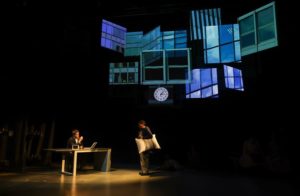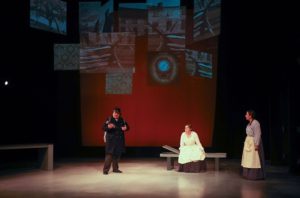
a scene from the Villanova Theatre’s World Premiere of Wendy MacLeod’s POSTERITY
By Ellen Wilson Dilks
Ev’ry time I see your face,
It reminds me of the places we used to go.
But all I got is a photograph
And I realize you’re not coming back anymore
~ Ringo Starr, PHOTOGRAPH.
Villanova Theatre’s latest production is a World Premiere of Wendy MacLeod’s POSTERITY, a play that examines how we preserve our pasts through photographs. Ranging from the Civil War through to the present, it follows three families as they try to make connections to their history via photos left by loved ones. The production runs at the Mullen Center through November 19th, 2023.
Photography as we know it can be traced back to the latter part of the 1800s, with “tintypes” by such noted photographers as Matthew Brady. However, we can go all the way back to ancient China and the “camera obscura”—a way of creating fleeting images by means of a small point of light shining into a dark space. It was the discovery of using silver nitrate and sliver chloride in the 1500s that started the advancement towards creating film to permanently preserve an image. POSTERITY delves into some of this.
My late husband was a professional photographer, and I learned a lot about the art form from him (Yes, it is an artform). I learned about composition, apertures, F-stops and the beauty to be found in black & white photos. I learned about the thrill of photos documenting family history, especially when I found a photo album my grandfather created in the early 1920s.

POSTERITY at Villanova now through November 19th
Director Edward Sobel has gathered a talented technical team that cleverly bring the world of the play to life. Stefanie Hansen’s simple, yet elegant, scenic design smoothly changes to the various location of the story. Alan Price’s projections that appear on various rectangular and square transparent screens that hand above the stage at different angles, heights and depths. These take the viewer from Civil War Era America through to the present day, showing images of a farmstead, a wedding hall, a labor and delivery room and the rec room of a mental health facility. The costuming by Rosemarie McKelvey nicely takes to these multiple time frames, while Elizabeth Meisenzahl provides the appropriate props. And the lighting design by J. Dominic Chacon is beautifully done. A solid soundscape is the work of Elizabeth Atkinson. Lovely original music for the production was composed by Peter Hillard.
There are places I’ll remember
All my life, though some have changed.
Some forever, not for better
Some have gone and some remain.
~ Lennon & McCartney, IN MY LIFE.
Sobel’s cast is a talented mix of MFA students and undergrads. Most of the six performers take on dual roles. Michael Pliskin plays both the charming photojournalist Henry and Sam, the father of a teenaged boy wrestling with mental health issues. A part-time grad student, he has a firm grip on both of these men and navigates between the two quite well. Gloria, a nurse at the mental facility, is nicely played by MFA student Noelle Diane Johnson. She deftly shows the viewer a woman who is facing her own pain while trying to help others with theirs. Margo Weishar, a Theatre Certificate student, plays two mothers: Pearl, who is grappling with her son going to fight in the Civil War, and Ginny, a photographer who has documented her children’s lives—sometimes too invasively. Weishar smoothly morphs from the brusque but loving Pearl to the somewhat detached Ginny with aplomb. 2nd year grad student Emma Drennan takes on two sister roles: one from the Civil War era (Lydia) and one from present-day (Hannah). Ms. Drennan nails the odd love-hate dynamic between brothers and sisters. Nathan Trementozzi, a 1st year grad assistant, nicely portrays the earnest Thaddeus—who believes the South will win in very short order—and Jasper—a confused, depressed college freshman who ends up in the mental hospital. Sara Buscaglia, a 22nd year MA student, gives life to Rose—a newlywed full of life and humor—and Minnie—a no nonsense young woman. All six performers are well suited to their roles, and hold our attention. MacLeod has created intriguing 3-dimensional characters for them to play, and they have stepped up. All of these people are dealing with loss—a universal feeling none of us can escape. MacLeod, Sobel and the actors beautifully navigate these twists and turns in the tale.
The first image that appears on one of the screens is a clock, which, to me, shows that time is fleeting. I think it also symbolizes that photographs last a long time, and they will keep our histories—big and small—alive for future generations.
POSTERITY takes the viewer through an intimate and complex history of three families. Yet, the themes are familiar to all humans. We all want that connection to our past, to our ancestors who made us possible. To those we’ve lost. Why else would Twenty-Three & Me or Ancestory.com be so popular…
WHEN YOU GO: POSTERITY runs now through November 19th at the Court Theatre in Villanova University’s Mullen Performing Arts Center—which is located at the corner of Lancaster and Ithan Avenues. The remaining performances are as follows November 11, 16, 17 & 18 @ 8pm, November 12 & 19 @ 2pm. Special events enhancing the production experience include a Speaker’s Night on the 12th, and “Drinks with the Dramaturgs” on the 17th. The performance runs 75 minutes—with NO intermission. POSTERITY is recommended for patrons over the age of 17, due to some very sensitive topics depicted in tis gripping play . The facility is handicapped accessible—patrons should call the Box Office at 610.519.7474 or email at mullenboxoffice@villanova.edu for details. There is plenty of off-street parking, with some inclines involved in getting from the parking areas to the entrance to the center.
CONTENT WARNINGS: for those who may be triggered, POSTERITY deals with the following issues: infant mortality, mental health issues, possible child abuse and suicide.
COVID Protocols: Villanova follows all CDC recommendations. At this time, vaccine cards are not being checked and masks are voluntary.